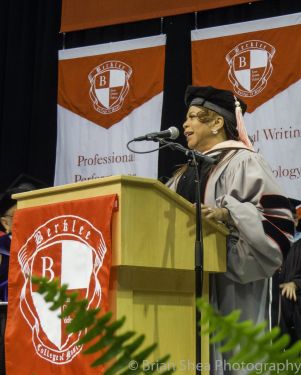Interviews
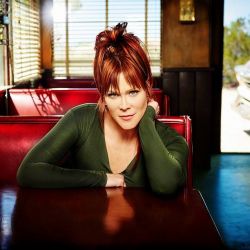
- Details
- Written by: Giovanni "Gio" Pilato
It's a cold, wintery afternoon in London, United Kingdom when Bluebird Reviews goes to give the award as Artist Of The Year for 2016 for our website to Los Angeles singer/songwriter Beth Hart. The past 14 months have been certainly among the most intense and rewarding for the American artist; while still enjoying the huge commercial success of the 2015 Better Than Home album, here comes, totally out of the blue, a brand new record and perhaps one of the most inspired one that Hart has ever made in his career, called Fire On The Floor.
It's a bit of a mystery how Beth Hart could have found the time to write and record a new album shortly after the successful Better Than Home, given the intense touring that the American singer/songwriter faces every year. "Check this one out, because, hand on heart, I am telling you nothing but the truth! It took less than two weeks between meetings with Oliver Leiber and then three days in the studio to record, that was it! That was all it took to make the album. This album was made directly after Better Than Home and the reason why it was made in that time, it was because before we left the New York Studio, where we later spent about seven days for the recording of Better Than Home, we got back home in L.A. and I was starting feeling a bit of anxiety, given what was happening at the time. Better Than Home was a very painful record for me to do and I was aware that Michael Stevens, one of the producers of Better Than Home was dying (he then sadly passed away in October 2015). As a result, even before we started the mixing process for Better Than Home, I called Ed Van Zijl at Mascot (Hart's label) and I said to him: "Dude, if I don't get in the studio right now and make another record, I'll probably never go back in there ever again, after the experience I am living". He said to me "What's happening? Are you not satisfied with how things are going with Better Than Home?" to which I replied "I haven't got the faintest idea because that album has not even been mixed yet but I am positive the Team mixing the album will make a great job. The bottom line is that I need to get back again in the studio, now, please". When I then got the "Go Ahead" from Ed, I was very excited again and I couldn't quite believe I was given that chance. Then it's me back on the phone with Oliver Leiber, telling him "Man, can I come and see you? I need to talk to you". I went there and and he could spot something about me, asking if I was ok and I told him I was feeling ok but having a tough time lately. I asked him if I could make another record with him and he said "Sure, just send me the songs".
Read more: God Is In The House - In Conversation With Beth Hart
- Details
- Written by: Giovanni "Gio" Pilato
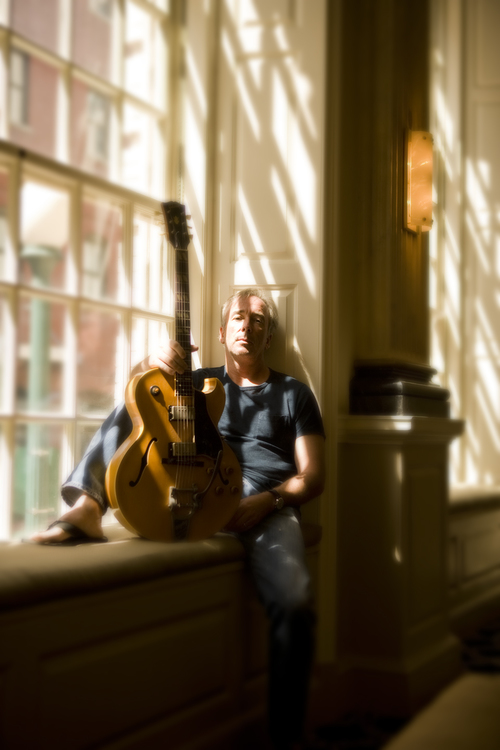
Sometimes, humans can only take life one step per time, especially those that had to go through some difficult, personal downfalls. They all have a different way to express their anxieties, feelings or emotions and overcome them in their own way, either through physical expressions or, in the case of musicians, through their own artistic skills.
Grammy-nominated singer/songwriter Michael Marquart, aka A Bad Think, knows one thing or two about going through difficult, emotional journeys in one's personal life. Through the years, his records have constantly shown Marquart's ability not just as a great composer of songs but also as an acute observer of everyday's life and how much that does impact relationships among people.
His brand new album, The Tragic End Of A Dreamer, is the artistic parabola of an ill-fated dreamer that goes through a series of highs and lows in his life's journey, superbly narrated by Marquart and his impeccable song-writing style.
Together with writing and producing the whole album, as Marquart has always done for every A Bad Think release, this time around the artist from FT. Atkinson, Wisconsin, has played also most of the instrumental and the vocal parts on The Tragic End Of A Dreamer.
When Bluebird Reviews has finally the honour to talk with the ex-A Flock Of Seagulls drummer about the release of A Bad Think's new album, Marquart sounds in great humour and explains briefly the length of time it took to write and record The Tragic End Of A Dreamer. "It took about two years of writing. The songs came to me gradually and the whole process, as I said, took almost a couple of years between writing, recording, mastering, etc. and I am very happy and proud about the finished result."
Undoubtedly, A Bad Think's new record sounds even more personal than any other previous release, digging deep into what it might have been, presumably, a difficult moment of Marquart's life. "Yes, it certainly was. As you know, all my albums are very personal and self-reflective. As many things happening in most people's lives, I guess, this album mirrors things happening in my life going along in a way, expecting to end as well in a certain way. Then, when you realise that things didn't actually go in the way you originally planned, rather than being upset, you start thinking "Well, perhaps that was the way I unconsciously thought that things were going to end like", almost in a sort of awakening way. All in all, rather than being a Tragic End, as my album title would suggest, this record sees a rather happy ending for me, which is good news!".
Marquart has always been a very prolific songwriter and A Bad Think's new record is an ulterior proof of it. The Tragic End Of A Dreamer sees an artist paying a meticulous attention on each note of every song, almost to accentuate the message that Marquart is carrying already through the lyrics. Given the time spent not just on A Bad Think's new album but on every album, Bluebird Reviews is wondering which of the two aspects, between songwriting and recording/producing is more time consuming for Marquart when it comes the time to make a new record. "Well, you hit it right on the head. I spent so much time on every note, even thinking about the spaces in-between all the notes or how certain lyrics need to go with certain chords. I think about all aspects, while making a record, including the most minute. It's always a very emotional and draining process for me, working on an album. There isn't a one particular part in the making of a record that is more time consuming than the other. It's all connected, the music, the lyrics, the atmosphere that I create, the feeling, the emotions that I try to deliver to the listeners. It's a kind of multifaceted experience for me."
The Tragic End is an album that carries many different layers of sound, sometimes verging into Ambient, some others into Southern Rock, Folk, Alt-Rock, even little hints of New Age, showing clear signs of a versatility that Marquart must have been carrying within since the early stages of his career. "Yes, music has always been kind of all over the map since I was a teenager. I have been, in the past, in all sorts of bands, Heavy Metal, Punk, Folk, you name it. As I write my songs, I always let them go freely without trying to steer them in a certain direction. I don't try to railroad them down in any particular genre, I just let them go wherever they want to go. Rather than trying to control where they are going, I just try to get myself out of their ways (laughs)!"
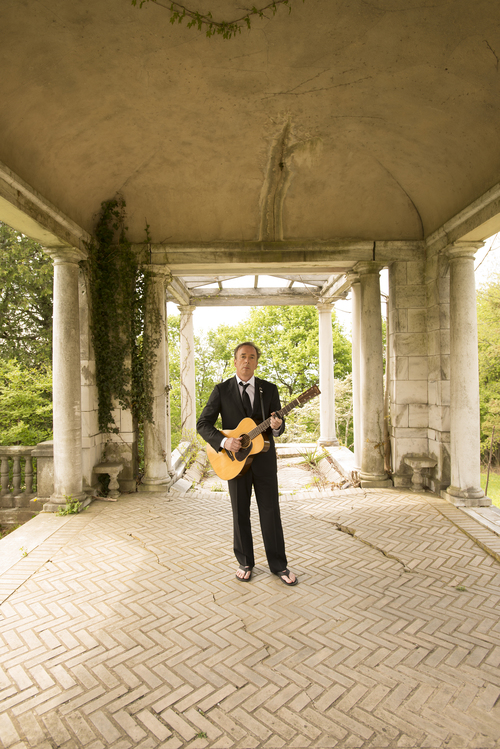
A Bad Think's new album is, in many ways, the ultimate modern Alt-Rock symphony. Marquart's songwriting on The Tragic End Of A Dreamer is exquisite, especially in the central section of the album, with that superb trio of songs that are The Animal, Loyal Men and For What It's Worth. A wonderful album which surely, on some stages must have had some particular tunes a bit more trickier to write and record than others. "The trickiest one would either have to be No Way Out or Loyal Men. For Loyal Men, I had to fight with that one for a while. The reason is that there was something that kept bothering me about that song, something I thought it was not quite right about it. It took me a while to figure out how to put together the pieces of that puzzle but in the end, I managed to do that. No Way Out, well, that particular song has got 115 tracks on it, which are all used on that tune and it was a bit of a challenge to keep it like that, as you can imagine. They were certainly the two tracks that needed a lot of extra work to be done but I am completely satisfied with the outcome."
Modern society can kill one's dreams but can never kill the dreamer. For an artist like Marquart and considering his personal vision of what music is all about and stands for, we are intrigued to find out how difficult it is, in nowaday's music business, to be able to remain true to himself as an artist without compromising any aspects of his art. "That is such a good question, because it is really difficult these days for artists to be able to do what they really want to do. If you happen to get lucky enough to land on a record deal, they try to make you sound and look in a way that it's not really you and, as a consequence, it really gets hard to stay true to yourself as an artist. I am very privileged and fortunate that Windmark Records lets me do whatever I wanna do and they create the leeway for me to be able to generate my music and my records. But it is really tough for any musician, experienced or up-and-coming ones, especially for the latter."
Once upon a time, music was considered a very therapeutic art form and it had a massive impact on people's lives. Bluebird Reviews was just wondering, in Marquart's view, how much can, in these days and age, the power of music be still therapeutic for people as much as it is for who creates it. "I still believe that music is very therapeutic. Back in the days, music was so powerful that you could hear a song, a pure piece of music and that would actually change your life and you could become a better person, simply by hearing that tune. I still believe that music has still got that power, even now. I feel that perhaps younger people get very distracted by things like Social Medias like Facebook, Twitter etc. and music becomes simply background noise for them. Perhaps I am a dreamer, but I still believe that there is people out there that takes time to listen to music and let the music take them to places of their souls that they did not even know they existed. That is the reason why I keep doing what I do, when it comes to make music, because I want to try and keep that belief alive."
Some of the lyrics in A Bad Think's new album quote "Sometimes the movie starts without a sound, and sometimes the movie ends too soon". Should Michael Marquart be able to look back to the beginning of his career and where he is right now, as an artist and as a human being, how would he describe the movie of his life so far? "You know, the older I get, the wiser I get and the happier I am. It's almost like a process in reverse, for me. When you are younger, everything looks great to you, you are happy and feel invincible. When I think about all the music that I played with different bands, in the past, I see that as a part of a whole process to get me through to realize that you really need to be true to your music, always. At the end of the day, what I play is who I really am and what I have to say and it's the best that I can do, as a musician, in that particular day. I wish I had this point of view and learn that lesson when I was younger, rather than playing the stuff that was popular at the time. But the good news is that, hey, I am still alive, I still keep going and I am still enjoying the ride. It's getting better and better as the years go by and I feel really good about where the movie of my life is taking me to."
Giovanni "Gio" Pilato
The Tragic End Of A Dreamer is out now and it is available via Windmark Records
- Details
- Written by: Giovanni "Gio" Pilato
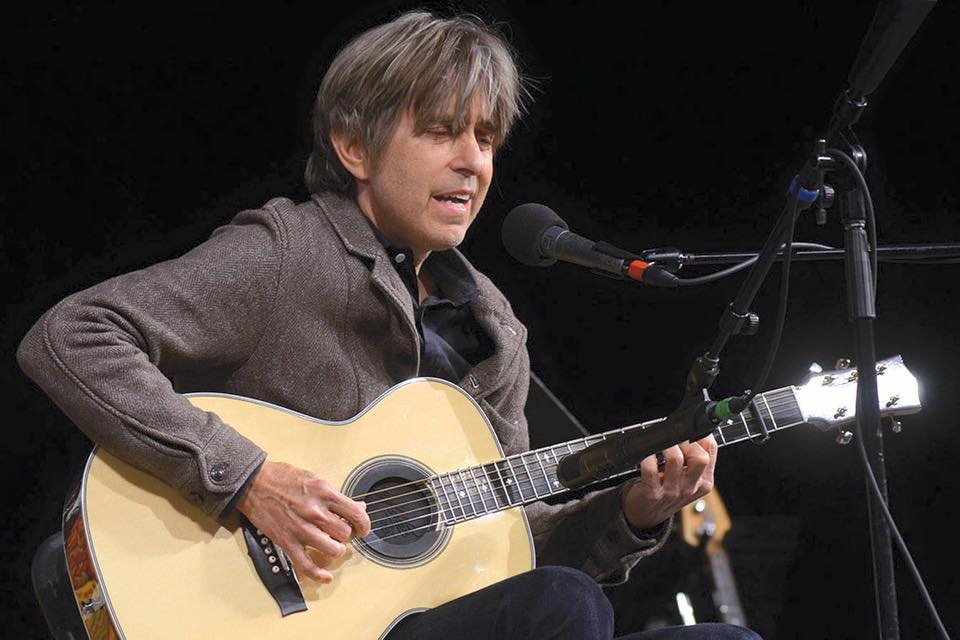
Sometimes music artists spend relentless period of times trying to nail the right sound effects, to write the right lyrics, find the right producer or to cut the right vocals in the hope to make their albums a true masterpiece.
Rather fortunately, though, there are still musicians out there able to play a more stripped-down music style, still achieving brilliantly their ultimate goal, which is to bring their music to the masses.
Eric Johnson, the Texan-born veteran guitarist and one of the most talented and versatile blues/rock artists worldwide, has totally and perfectly embraced this concept, by releasing, towards the end of 2016, the very first acoustic album of his career, simply called EJ.
The album is a total revelation for old and new fans of Johnson's music. An eclectic collection of superbly balanced songs, plus some instrumentals and a bunch of covers, the whole executed in such a phenomenal style, a true pinnacle in Eric Johnson's career.
When Bluebird Reviews has the opportunity and the privilege to discuss with the legendary Texan guitarist and singer/songwriter his brand new album, Johnson is affable as always and sounds in a really good humour.
BBR - Hi Eric, thank you so much for talking to us at Bluebird Reviews. EJ, your brand new album, is your first ever acoustic one after three decades in making music. Which criteria did you follow in choosing the songs that ended up being on EJ?
EJ - I just went in the studio and recorded a bunch of songs that I had in mind to record for a while plus a couple of new ones that I wrote and included in the record. I believe I managed to capture, on EJ, the best performances of songs that I played live that I had a good take of. Few of the songs I had in mind, they didn't quite make it, compositionally, so I kind of threw them back in the pond but the ones that I thought were good compositions, I just kind of over-recorded them and looked for takes on which I did a good performance on. I actually have a bunch of more acoustic tracks that I am considering to put on a possible EJ Vol. 2 but I just need to get good enough performances of those songs, because I just want to get the best takes possible on the next album, as I always try to achieve on all my records.
BBR - EJ sounds a bit like a therapeutic album for you to record and something you truly enjoy doing, something that allows you to let your artistry completely break free. What triggered this sudden desire to explore the beauty of playing and recording music in a more stripped-down form?
EJ - Well, playing acoustic it's something that I have always done in my private life which, for various reasons I have never included that much in my electric albums. I guess that, generally, my style of playing nods more towards electric kind of stuff but on this album, I thought that the fans wanted to hear a more stripped-down version of my music. I think that in the last couple of years I have arrived to the conclusion that I want to include more stuff, especially acoustic, on my records, which is something I totally enjoy. All in all, through an album like EJ, I just wanted to be a bit more balanced, musically, with everything I like.
BBR - Your new album features some of the most inspired instrumental tunes I have heard for quite some time, from your own version of that timeless classic that it's Mrs. Robinson to some authentic jewels like Serinidad, Once Upon A Time In Texas and Song For Irene. Have such tracks been composed long ago or are they the spontaneous outcome of your improvisational skills, at the time you recorded EJ?
EJ - Actually, Song For Irene is a song that I wrote in the studio, while I was making the record and I think that it was the last thing I did on the record because it just came to me just like that. For Mrs. Robinson, well, I was looking to find the right way to start the record with and I though that making an instrumental up-tempo version of that classic was the best way to launch off the album. They just came in different times, all the songs. There are probably two or three songs on the album that I actually recorded several years ago, the rest of the album was written and recorded in the last six, seven months prior to the end of the recording process.
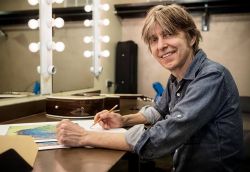
BBR - We all know, at Bluebird Reviews, your great love and respect for a guitar giant like Les Paul, to which you paid an artistic homage on The World Is Waiting For Sunrise. It was, though, slightly unexpected to see two Simon & Garfunkel's songs featured on EJ. How much did their music contribute to your artistic growth?
EJ - Well, they are kind of one of the soundtracks of my childhood. I liked to listen and I still do to a lot of folk music. It is something that, despite the fact that I did not include in any of my previous records, it's part of my musical DNA. I grew up listening to these guys, as I did listen to a lot of James Taylor, Joni Mitchell, Bob Dylan and stuff like that, so, in answer to your question, it's something that has always been in the back of my mind because it has been part of my musical formation. The Simon & Garfunkel songs included on EJ are such great songs and I just wanted to work on them with different arrangements, approaching them in a different way. At the end of the day, a good song is a good song, regardless of what flavour you apply to it and how you do it.
BBR - Even when you don't touch your guitar, you are still able to gift memorable music moments to your fans, like that goose-pumping tune that is Water Under The Bridge, executed with just piano and voice. What is the story behind the wonderful lyrics of that song, Eric?
EJ - I think it's a song about not holding everybody or keep tabs on everything. I think it's pointless to do that, it's important to forgive people on stuff of the past and to focus on moving on in your life. Regardless whether we have got a reason to hold on on stuff or not, if you keep going on about this type of things in your personal life, it kind of becomes poisoness to yourself in the end. It's much better and healthier to let it go and move on.
BBR - How many different guitars have you been using on EJ?
EJ - I mostly used a 1981's Martin D45 and I also used a Ramirez Classical and a Silvertone Acoustic on Song For Irene.
BBR - Texas is America's holy land for guitarists, either born and bread there like you or people like Billy Gibbons or adopted one like Lance Lopez, Omar Dykes or Mike Zito, just to mention few. Have any of you considered, one day, to join forces and take on Tour the cream of Texas guitar players?
EJ - Oh, boy, that would be real fun! We should call the project T3, rather than G3, wouldn't that be just fantastic!
BBR - Eric, in November 2016 you finished your Solo Acoustic Tour around the Statest with a fabulous hometown concert at the Paramount Theatre in Austin. Is there any plan, so far, to tour the EJ album also in Europe and the rest of the world?
EJ - We are currently discussing the possibility to extend the Tour even out of the States but it's all about to manage and fit it with my current schedule but I would be really up for it. I'd love to go back in places like Europe, for example, I have such fond memories of that part of the world and the fantastic crowds over there.
BBR - George Gershwin once stated that "True Music must repeat the thoughts and inspirations of the people and the time". What thoughts and inspirations does the EJ album carries within to describe where, right now, Eric Johnson and his music are?
EJ - I guess that what I am trying to do right now is to be more sincere, more honest, genuine and spontaneous. Most of all, trying to make people feel more inspired and lifted through my music. I don't know if I am succeeding in making people feeling that way, but that, believe me, is my ultimate aspiration.
Giovanni "Gio" Pilato
- Details
- Written by: Giovanni "Gio" Pilato
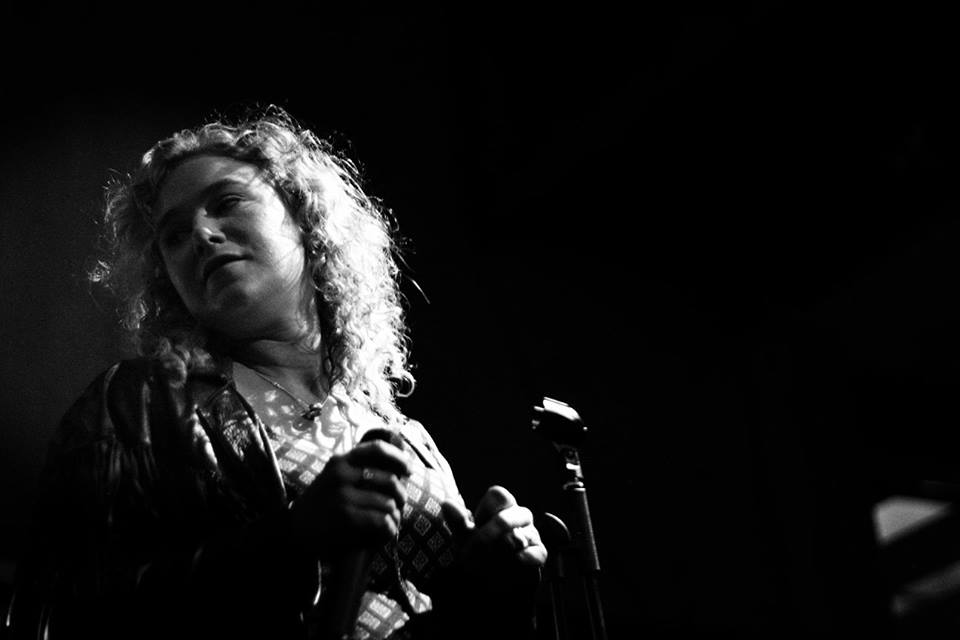
(Photo by Celina Dasneves)
The story of a musical turnaround. That is, perhaps the best way to describe what happened in the last 6-7 years of life of the Canadian collective No Sinner, from being on the casp of calling it a day to make a massive come back with a brand, ballsy and beautiful new album, the 2016's Old Habits Die Hard.
Colleen Rennison, No Sinner's band leader, has been through a very long journey with the band so far in her career, a true Thunder Road, paraphrasing a famous song. Despite all she has been through though, since their 2014's well received debut album Boo Hoo Hoo to the new one, an album that sees the sound of the band turning more into rock territories, Rennison looks happy and very satisfied when talking to Bluebird Reviews at The Borderline in London, UK, about their new album. "Boo Hoo Hoo did actually come out in 2011 but just released by the label in 2014. I would say that Old Habits Die Hard reflects more our true sound and who we are, as a band and as we have always been sounding live on stage. Boo Hoo Hoo was written with an acoustic guitar, with one friend on a kitchen floor while Old Habits is more on what No Sinner is all about and it was a great shame that the album was not released earlier. I feel, in some ways, that Boo Hoo Hoo misrepresented who we are as a collective because the songs on the new album have been ready and played many times before on stage since 2011. A lot happened since Eric (Campbell, the band ex-guitarist) and I were together in the band. There were good times and less good times and sometimes it felt like everything was falling apart but, in the end, it's great still to be here. This European Tour that we are just due to complete has been a splendid experience for myself and the band. To get to play overseas, where you may think that not many know our music and then to be overwhelmed by so many people attending our shows, buying our records... Man, that is such a gift. It shows that people really care about us and our music, which is great".
A sound that has certainly changed a lot, since the departure of Eric Campbell, with a new line-up that make the No Sinner's sound more primitive and powerful. "I would say it's definitely raw, heavier and more real than what it used to be on our first album. I think it's a matter of connecting between musicians, rather than how good you may be as a musician. When Boo Hoo Hoo came out, after we agreed on the album's release, although the songs were fairly old for us, the band fell apart and we felt that we didn't give a damn about No Sinner anymore. There was a lot of tension between all of us at the time but I couldn't let go the whole No Sinner project because the songs that ended up on Old Habits were already there. With the new band, it felt refreshing to me to play those songs and to feel different and exciting vibes and a new found enthusiasm with the new guys in the band because we really connect with one another. We have such a ball all the time we are together and play, I just love these boys. I think you can sense how well we do get on by watching and hearing us playing live on stage. You get a real sense of a band giving it all every time, a true cameraderie going on stage. I cannot wait to start writing new material with the boys because there is finally the feeling that No Sinner is a strong musical entity and that was something I have missed for a long time".
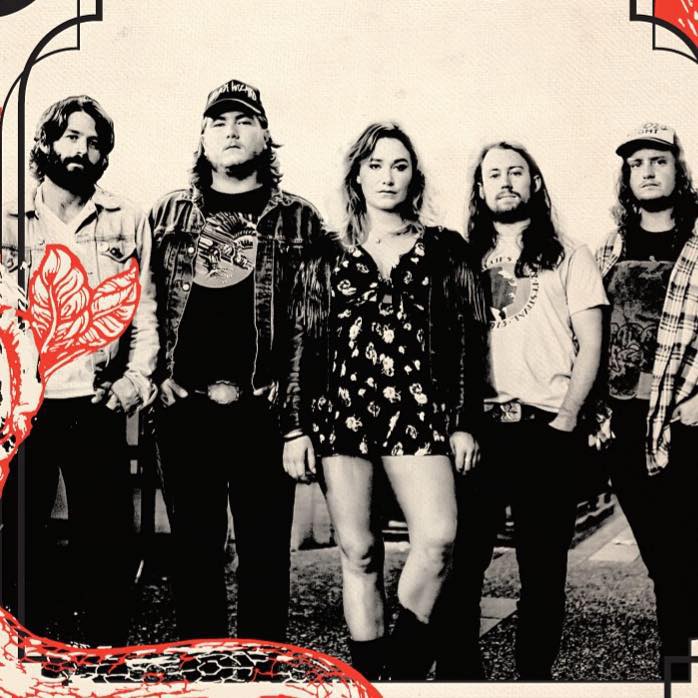
The Canadian artist, prior to the release of Old Habits Die Hard, has been working with producer Ben Kaplan, somebody that has worked a lot with bands in the past with robust rock imprints and our website is wondering whether his work as a producer has shaped the songs of the album in a different way, in comparison to how they were originally created. "Not at all. Ben Kaplan had very little to do with the album overall. We had the opportunity to select a couple of producers for the album but in the end, we went for Ben because he was there and available at the time that our record label gave us the financial "go ahead" to complete the recording. I feel kind of bad that the album did not reflect exactly Ben's vision about a rock album but all that I wanted was to get it finished. At that stage, I did not even have a band, there was just myself and Ben in the studio and, not having any producing experience, it was a great relief for me to have somebody like Ben being there and helping to finish the album. Completing and releasing Old Habits almost killed me and perhaps, the overall sound of the album it's not exactly the one I intended in the first place, but I am glad it's done and it is out there. I couldn't allow myself to walk away from a body of work that carried through my twenties without finishing what I started back then. No way".
The No Sinner's band leader is one of the most versatile, talented singer/songwriters and performers around. Through the new album, one may appreciate even more the beauty and the power of her beautiful voice, something that she might have discovered to have from the early stages of her career. "I didn't think that my voice was that fabulous in the beginning but I started singing when I could walk and talk, you know, it was just something I was doing naturally in my everyday's life. I don't think it was a proper discovery but, I can surely tell you that I knew I had a good voice before anybody else knew it! (wink)".
Old Habits Die Hard introduces, among the many qualities of the record, also a witty side to Rennison's songwriting style through the closing track of the album, Mandy Lyn. The song is robust, thunderous and wild and sums up perfectly the philosophy of No Sinner as a band but does really Mandy Lyn exist or is she just a fictitional character? "We wrote that song even before Boo Hoo Hoo came out. The story behind it is true and it was referring to when myself and Eric went on a crazy road trip with this photographer, Mandy Lyn, actually a very good photographer. She is a F&%$ing bitch but she really is a great photographer! She was starting flipping out while we were in a hotel in Reno, she was losing it and starting to have an episode. Eric and I, at that point, we did not really know what to do so we started playing this song that we made up on the spot, a bit like an improvised nursery rhyme. After that episode, our relationship changed and she ended up doing some really crazy things in her life. We added to that song this Zeppelin's typical 70's sound and turned this made-up nursery rhyme into a song and added in the lyrics all the bullshit that the relationship brought between me and her after that episode. As I said, Mandy is a very talented photographer, a firecracker and a very serious person but she can be a bit of hard maintenance, when we were hanging out together. To cut it short, the song is about somebody that was a friend of mine in the past and no longer is".
One of the virtues of Old Habits Die Hard is the ability to carry, throughout the album, the sound of different decades of rock and roll. "You know, due to the fact that this is an album that has been released through a long period of time since its creation, I guess that, as many musicians do, you just go through different phases and stages. I remember that there was a period where Eric and I listened to a lot of Prince's records, or periods in which we were either hooked on David Bowie's stuff, or Allman Brothers or Joe Cocker, it varied. You can feel that kind of musical schizofrenia throughout the album and, in the songs of Old Habits, I can perfectly see the different influences we went through to during the last 6-7 years. When I listen to the record now, it's like I am almost hearing many different people and different sides of myself and Eric, our musical metamorphosis. You don't realise how much you change, as a person, the kind of evolution you go through especially in a crucial time of everyone's life, like the twenties are and this record is the perfect demonstration of the musical journey we went through".
Whilst Rennison was in the process of having Old Habits Die Hard released by her record label, she was offered the opportunity to record a solo album, See The Sky About To Rain, a delicate and eclectic collection of Canadian folk and country music covers, a challenge Rennison truly enjoyed a lot. "Well, it was a cool challenge for me because I had to dive into the Canadian songbook. When you have people like Joni Mitchell, Neil Young or The Band, for example, with such rich repertoires, that was never going to be an easy task to deliver. It was a true discovery, for me, to find out songs that I have never heard before, like Leonard Cohen's Why Don't You Try. I must confess that we tried to cover Chelsea Hotel but it didn't really feel right because we wanted something a little more obscure that would have represented the work and the nature of this great artist. Either than that, some of the songs on See The Sky About To Rain are more related to my childhood, something that I would have always dreamt, since I was a child, to be able to sing one day and put on a record. Blue Wing (by Tom Russell), is such a personal and powerful song for me because it reminds me of the only place where I have ever heard of that tune, which was the back seat of my dad's car. I have absolutely loved making this record. Funnily enough, this album was supposed to be released even before Boo Hoo Hoo but because my record label had to delay the release of our debut album, as a consequence, also See The Sky's release was postponed".
No Sinner are from Vancouver and the sound coming from one of the biggest cities in Canada has certainly gone through a lot of changes and evolutions through the years, something that Rennison has lived on her own skin too. "Definitely, the city has moved on a lot. As for many other parts of the world, Vancouver too has certainly felt the positive impact of social networks like Facebook, for example, which has allowed many artists to be able to make their music available to millions and millions of people. That includes No Sinner too. As a band, through those social platforms, we had the opportunity to connect with people and for them to find out about us and our music. It has been a true game changing for us as No Sinner, for all Vancouver's artists and for thousand of musicians around the globe. We have now this amazing social DIY tool that allow us musicians to expose our music and spread it directly to the masses. This is certainly, in itself, a massive step ahead not just for the future of music but also for the freedom of creativity of many artists. Sometimes, through this new media platforms, you don't even need to be very good as a musician to be popular and to make your own niche in the music business, as long as you are cool and interesting for the people out there. You can pretty much create your own profile as a musician because the Worldwide Web allow you to do so, avoiding to go through sometimes painful processes within the music business. In that way, you can maintain your integrity as an artist because you won't have anyone breathing on your neck and just shows your artistry in full without limitations. Steps forward for music independence like these are always very welcome".
It's always refreshing and exciting to meet Colleen Rennison. The canadian artist carries into the songs she writes her strong personality, both as a woman and as a performer. Before parting company with Rennison, Bluebird Reviews asks the Canadian artist how much does music give to her emotionally every time and how much does she feel she is giving back to music through her artistry. "Music means life to me. It's such a big part of who I am, I need it like I need water or oxygene to be able to live. If I don't get the chance for a long time to belt out and express my feeling by singing my songs, I kinda get crazy, I feel like I am exploding, it's the way my body works, I guess. Music gave me a lot, it gave me my friends, these awesome guys in the band, the opportunity to travel the world, it gave me freedom. As a consequence, I always try to treat music with respect and approach it with integrity and honour, for the gift that I have been given. I always try to be as honest as I possibly can in my songs and write them from my heart and soul. I never try to sell an image of myself that is not the real me, because I don't want to bullshit anybody. What you see is what you get".
Giovanni "Gio" Pilato
- Details
- Written by: Giovanni "Gio" Pilato
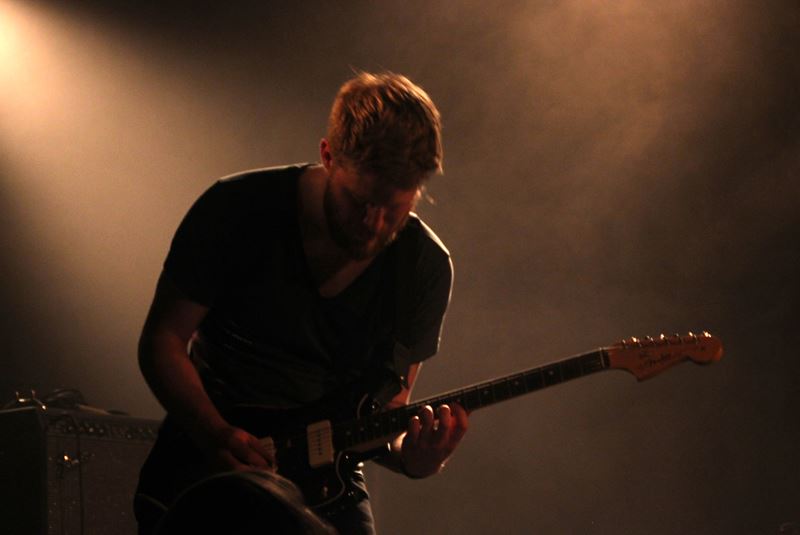
You need to go to Iceland to understand what makes a country like that so magical and the people living there so truly unique and open-minded. The darkness of their landscapes, the majesty of their glaciers and even the feisty, cold winter wind that blows from Rejkjavik to Eskifjordur is all part of one of the most special countries in the world.
All those aspects certainly must make an impact on the artistic creativity of the Icelandic people, given how much this country has gifted the music scene with artists like Bjork, Sigur Ros or Emiliana Torrini, just to mention a few of them, through the last four decades.
When in 2007 four young teenagers from Rejkjavik, Kjartan Hólm on guitar, Guðfinnur Sveinsson on guitar too, Elvar Jón Guðmundsson on bass and Jóhannes Ólafsson on drums (then replaced by Andri Freyr Þorgeirsson) got together to record in few hours their debut album, totally instrumental, called Reistu Þig Við, Sólin Er Komin Á Loft... (meaning Rise and Shine, the Sun's Up...), nobody would have expected the impact that their sound made not just in their native Iceland but in many countries worldwide. Their music is instinctive, raw, travelling in the same way a locomotive may do, with sonic acceleration and deceleration executed with the heaviness of an experienced rock band and the ethereal fluidity typical of the Icelandic music sounds. The band decided to call themselves For A Minor Reflection.
Opening for Sigur Ros in their 2008 Tour, gave the opportunity to the band to have global exposure in the music business, something that allowed them to create a more sophisticated second album, a year later, called Höldum í átt að óreiðu" (Heading in the direction of Chaos). Their second record did, commercially, very well too and the band continued their career as For A Minor Reflection until 2013, by releasing the live EP Live At Iceland Airwaves.
The band, although not officially dismantled, has stopped their activity since that live album and the band members have all gone for separate ways, getting involved in new music projects but still maintaining a great relationship and, who knows, maybe the doors open to the future for another release as For A Minor Reflection.
Bluebird Reviews meets one of the main creative forces of the band, guitarist Kjartan Holm, to talk about the career of such a seminal band like For A Minor Reflection, in proximity of the 10 years since the release of their debut album. Holm has just released a new album with his new band called Tofa, a highly interesting post-rock music project. the album, their third as Tofa, is called Teeth Richards and, despite the pressure for the ongoing promotion of Tofa's new album, Holm kindly accepts to take us through the history and career of an extraordinary collective like For A Minor Reflection.
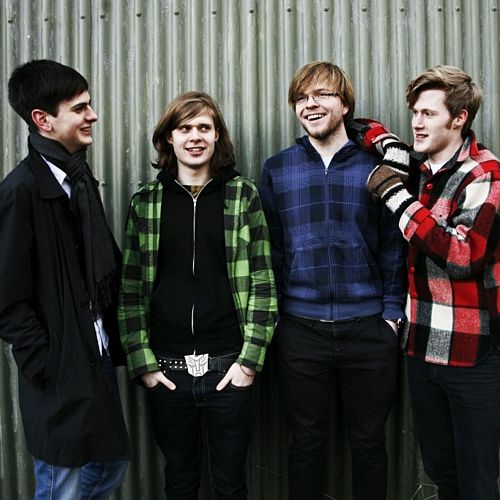
For A Minor Reflection - 2007 circa
BBR - Kjartan, welcome to Bluebird Reviews, so good to talk to you. For A Minor Reflection is one of the most original instrumental rock band of the last 10 years, recognised as such by the worldwide music press since your debut in 2007. Was the choice of creating music through instrumental suites a deliberate choice for the band since Day 1 or were you initially thinking of adding a singer to the band's line-up but then things just changed?
KH - Well, originally we thought about having vocalists in our band but, as we started playing together, we found ourselves increasingly more comfortable just being an instrumental rock band. So yes, initially we had other plans but when we realised that we were feeling more comfortable expressing our music in that way, we said "Hey, this is the way that works for us, let's keep it that way". Funny, when I think about it, because currently I am working with a band that includes vocalists and I feel very comfortable as well working with music in that way. I just enjoy exploring different sides of music and have an open mind. I think it helps me, as a musician, to be constantly challenged.
BBR - Your debut album Reistu Þig Við, Sólin Er Komin Á Loft... (Rise and Shine, the Sun's Up...) sounded so immediate. It was the work of 4 creative forces improvising on the spot and able to carve music in continous movement, with changes of tempo that then defined the band's style for years to come. Who have been yours and the band's music heroes that fired up the extraordinary creativity that the whole band express in their sound?
KH - It's interesting that, within the band, we all liked different type of music. I remember, back in those days, to be listening to a lot to artists like Blink 182, mainly that kind of College Rock Music. Gudfinnur instead was very much into Coldplay, Andri liked a lot of metal kind of stuff while Jon was listening to a lot of material of the English band The Smiths. As you can see, none of the bands I just mentioned had anything to do with the music that we were playing, which is kind of ironic. We shared though, within the band, a common love for the sound of bands like Godspeed You! Black Emperor and given how different were our music preferences, our inspiration was really coming from many different musical directions. Which is what helped our sound to be constantly on the move, rather than being static, which is not the type of art making we wanted to create. We just plugged in and away we went. As you said, our music was really a genuine combustion of four musicians carrying their own backgrounds, amalgamating them and creating something that we thought it was truly unique, back then.
BBR - In 2010, on the back of the huge impact of the 5000 copies that your debut album sold, you recorded the follow up to Þig Við, Sólin Er Komin Á Loft at Sigur Ros' studio in Iceland, in Sundlagin and mastered the new album, Höldum í átt að óreiðu" (Heading in the direction of Chaos) in Los Angeles. Given the more substantious budget you had at the time, do you feel that your second album shaped up the band's sound in a slightly different way or was the album just a natural progression of the band's musical path?
KH - I think that the way our sound shifted, on our second album, was due to the fact that it was planned in the recording, rather than doing it in the same way we did the first album. As you were saying, the success of our first album, touring a lot, partly with Sigur Ros, made possible that we could get the right financial platform on which we could build our second record. Whilst the first album was written in two months and recorded in just about 5 hours, in a garage, with a raw sound, full of improvisations and somehow also mistakes here and there, (if you really listen carefully to it), the Komin Á Loft album was instead super clean, in a way. Recording in a proper studio, with fantastic equipment, made certainly an impact on the way our second album sounded. You are certainly right about the fact that working in a proper environment changed the shape of our sound but I also thought that, because we wanted really to give to it a proper stab, like other bands out there were doing, we might have sounded a bit too refined, borderline commercial. In retrospective, I enjoyed much more working instinctively on the music in a more raw way as we did on our first album, because it's the same way I like to work right now with Tofa. In my opinion, it also captured more the essence of our art as a collective, while on the second one we were colouring our sound a lot more, by building some layers on top of our music and making it sound far too polished for my personal liking. We spent three months in L.A. making that album and that timeframe sounded like an eternity for someone like me, used to write music and record it on a much faster pace. Don't get me wrong, I enjoy working on music adopting many different approaches, including the way we did on the Komin Á Loft album but the way we sounded on our first record was more a clear mirror of my idea of making music.
BBR - The band has not recorded new material since the 2011 EP and there has not been a new release from FAMR since the 2013 live album Live At Iceland Airwaves. Is the band planning to surprise their fans with a new album anytime soon, to celebrate your 10th anniversary together?
KH - We were just discussing this the other day, it would be really fun to do something about it together next year. There are some logistic issues, though, due to the fact that we are now all living in different countries and we are all focusing on our individual projects with other bands. All that I can say is that we are not making any new music at the moment but we have a lot of unreleased material that we have accumulated through the years. It might be possible that, should we be able to find the time to get together and work on this yet unreleased material, one day we may release it on a new record but, at the moment, we are all focusing strictly on our own projects. To be honest with you, the material for a new For A Minor Reflection album could be already there to be released but, call it maybe being lazy or any other way you want, at the moment to work on a new For A Minor Reflection album is not our priority. We will see what happens in the future, anything is possible.
BBR - Kjartan, we are aware that the best part of the tunes written by the band came from your inspiration. What does help you to put you in the right state of mind when it comes to create new songs?
KH - When we made the first album, all the songs came from a very emotional part of ourselves, as a band. You know, coming from a country like Iceland where the weather is never really great and sometimes it's a bit depressive, it kind of triggered the state of mind that brought us to record the album in that way. I guess you may call it "atmospheric", in terms of general mood but I felt it was very simple and straight forward, in its lyrics. The second album was a bit more warm, not just in term of sound but about the style of the lyrics too. As I said before, we tried to apply to our sound a bit more colors that might have somehow, influenced also the general mood on the album. Thinking about your original question on writing songs, I guess that the real answer to you would be that I really don't know precisely what my state of mind was, when I wrote the songs on both the studio album. Maybe there was just an unconscious wish to express my happiness to be alive through the songs! (chuckles).
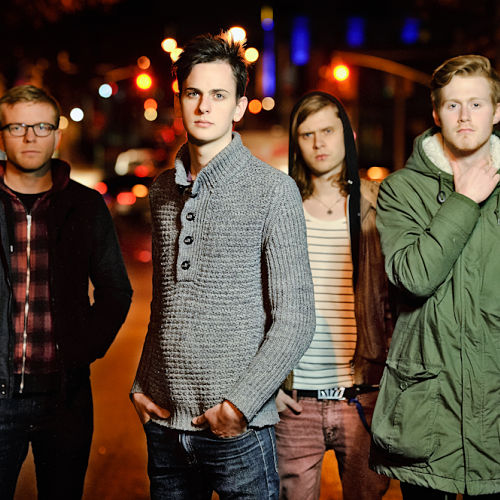
For A Minor Reflection - 2009 circa
BBR - Yourself and Andri, your drummer, are currently involved in another side project with a different band, right now, Tofa. How different is the sound of such bands from the For A Minor Reflection's one?
KH - It's a lot different from the FAMR's one. The current project in which myself and Andri are involved to, as you said, it's called Tofa. It is certainly full of energy, very noisy, almost brutal in its rawness, that's for sure! (chuckles). We record our songs ourselves in the way we like the most, without pulling any strings or spending too much time on mixing or adding any trickery. We have just released our third album, called Teeth Richards and, in comparison to FAMR's music style, with Tofa we have vocals through our singer, Allie Doersch. The songs are much shorter and faster and it took me a while before getting used to leave time for somebody within the band to sing, rather than blasting my guitar all the time. But in the end I got the nag of it. (chuckles).
BBR - Kjartan, in the last 10 years the music industry has suffered the biggest blow ever in its history. How difficult does it get, nowadays for young artists to self-finance and produce themselves and therefore to be able to express their artistry?
KH - I remember when we started as For A Minor Reflection. There were certain more opportunity for artists and bands to make records and travel abroad to tour, back in those days. As you said, nowadays everything is much more complicated. There is no more money left in the pot of the music industry, therefore everything is becoming much more, like Do It Yourself kind of attitude. It's definitely much harder to try and impose your art, within the business but it is not impossible. Just keep believing in yourself and do things on your own, a bit like I am doing right now with Tofa. I like to believe that there is always a way that things in music, as in life, work out in the end, as long as you keep investing in yourself and in your art.
BBR - Iceland is a magical country that has been so finely described through all its most favourite muses. Sigur Ros express through their music its nature and beautiful sceneries, Bjork all its different otherwordly, natural colours and Emiliana Torrini its mood, through delicate vignettes of Icelandic's daily life. Which of Iceland's many values do For A Minor Reflection carry through their music?
KH - Difficult to say. My first instinct would be to say that there is a certain connection with nature, as it often happens with Icelandic music in its globality. I remember when Sigur Ros released that splendid DVD called Heima, where their music was expressing all the different colors and movement of the Icelandic life. I feel that, at the same way, For A Minor Reflection's music, through its waves of alternated heavier and softer interplay within our songs, captures that same kind of vibes, although in our own way. Personally, the first thing that For A Minor Reflection's music makes me think of are the streets of Rejkjavik, the colors of the houses, the people, the vibes of our capital city.
BBR - The music genre that For A Minor Reflection has been labelled with has been often defined either as avant-garde rock or post rock. To the eyes of Bluebird Reviews, your music is just the natural chemistry between 4 skilled musicians. On an average, how many hours of jamming and music improvisations the band needs to record on tape, before deciding which material get chosen for any of your records?
KH - Well, believe or not, we never did a pre-recording session on any of our albums, to try and find the right mood for any new material we wish to record. We just plugged in and go. When we felt we had something we all liked the sound of, we were just going for it without thinking too much, just going for it. A very simple approach, perhaps old fashion, some might say but that is what worked better for us.
BBR - Kjartan, Bob Marley once said: "One good thing about music is that when it hits you, you feel no pain". Has music ever served you as a healer in any moment of your personal life or in your career as a musician?
KH - So many times. I listen to music, daily, a lot, until it gets time to go to bed at night, just to give you an idea. I can listen to stuff like, say from Bizet to Rihanna because for me there are no bridges with music, I can listen to either pop music or classical one without having to compromise with any of them. Every genre, every style creates a different connection with my emotions and it really doesn't matter what the musical source is or where it comes from. Music is certainly the best therapy I can think of. Well, perhaps that and some beers too! (chuckles).
Giovanni "Gio" Pilato
